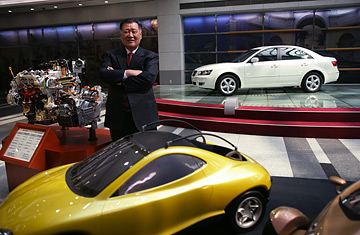
Chung Mong Koo, Chairman of South Korea’s Hyundai Motor, carefully scrutinizes a newly designed gearshift lever for the automaker’s Sonata sedan while his entire senior-management team hovers around, anxiously awaiting his approval. The execs are justifiably edgy. Engineers added a plastic plate beneath the shifter to prevent spilled coffee and other flotsam from falling into the mechanism and gumming it up. It’s a minor change, but no one treats it that way, least of all Chung, a hard-nosed, detail-oriented boss with a penchant for micromanagement. After eyeballing the gizmo from several angles, Chung demands, “Is this enough?” Finally, he nods his O.K. but reminds his execs, “We can’t allow any defects to damage our cars.” Chung, 67, has spent six years hammering that zero-defects message into the heads of Hyundai’s employees, and the result has been one of the most surprising turnabouts in automotive history. A few years ago, Hyundai, South Korea’s largest car manufacturer, was a synonym for shoddy. Seoul was the only place in the world where you were likely to see large numbers of its cars on the street. Today the company’s line of pleasantly stylish, relatively inexpensive and certifiably reliable sedans and sport-utility vehicles is tailgating the industry’s best-known brands in several prime markets. In the U.S., where the Sonata offers a lower-priced alternative to Toyota’s Camry or Honda’s Accord, Hyundai’s sales reached 419,000 cars last year, up 360% since 1998. In Europe, sales spurted 21% in 2004. In India, Hyundai’s 17% share of the passenger-car market made it the largest foreign automaker in 2004 and the second biggest car company overall behind Maruti, a Suzuki subsidiary. Hyundai is beating competitors by modifying its small cars with ingenious features designed for Indian customers, like elevated rooflines to provide more headroom for turban-wearing motorists. Perhaps most surprising: in China’s hotly contested emerging car market, Hyundai’s operation sold more cars than any other foreign joint venture in the first quarter, according to Singapore’s AutoAsia, an automotive data company. In fact, with a compounded annual revenue growth of 20% over the past five years, Hyundai has been the world’s fastest-growing major automaker since 1999, according to Lehman Bros. Hyundai is “putting pressure on everybody,” says Rob Hinchliffe, an auto analyst at UBS. Even Toyota vice chairman Fujio Cho last year acknowledged the blur that is getting bigger in his rearview mirror: “Hyundai has quality and prices that have caught customers’ attention, not to mention ours.”